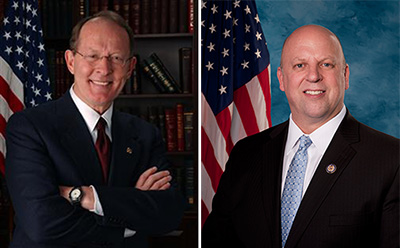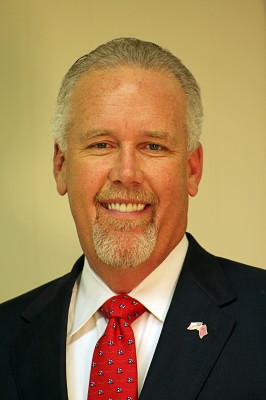
Lamar Alexander and Scott DesJarlais
These Numbers Are Just Plain Weird
State Rep. Joe Carr couldn’t raise enough money last year to compete for the 4th Congressional District race, so he switched to a Senate run against Lamar Alexander, who’s held just about every political job known to man.
Carr got swamped statewide by Alexander, the former governor, UT president, Education secretary, yada yada yada. But in Rutherford County, he brought in more votes—15,319 to Alexander’s 8,281 (that’s 62.4 percent)—than State Sen. Jim Tracy did against Congressman Scott DesJarlais.
Tracy picked up 13,587 in Rutherford to DesJarlais’ 8,898, 56.2 percent to 36.8 percent. If the veteran state senator had gotten as many as Carr, or won the 530 that Murfreesboro resident Steve Lane received or the 741 Bell Buckle resident John Anderson collected, he would’ve won the Republican primary with ease.
Instead, he made a premature victory speech and fell 38 votes short of DesJarlais across the 16-county district. The primary care doctor from South Pittsburg won 34,793 (44.89 percent) to Tracy’s 34,755 (44.84 percent), according to the Secretary of State’s website.
Apparently, the Bedford County Republican isn’t quite as popular as one might have thought. After all, he has represented much of Rutherford County for 10 years, but against a scandal-ridden DesJarlais and a field of unknowns, Tracy could garner only a little more than half the vote here.
In his home county of Bedford, meanwhile, Tracy picked up about 65 percent of the vote, 3,375 to 2,052. But that has been his territory for years, and he should have skunked DesJarlais there.
Once the votes were certified, Tracy lost by 38 to DesJarlais and ultimately decided not to contest.
Now it’s back to being state senator, and the dream of being congressman, which he has pursued for about six years, will be on hold again.
Carr, meanwhile, will have to find a job. By running for U.S. Senate, he dropped the state representative seat he has enjoyed for six years. His legislative salary, combined with cattle farming, have provided his primary means of income.
But check this scenario: If he can hold out for a couple of years, he could run against Tracy for state Senate. The election returns show he’s more popular than Tracy in Rutherford County, and as this county turns more Tea Party, Carr could have more appeal.
In his run against DesJarlais, Tracy just couldn’t separate himself. The first day he announced his candidacy at Reeves-Sain Drug Store—before DesJarlais could be sworn into office in 2012—Tracy was unable to say how he would vote differently than DesJarlais.
His only claims were that he would be a more morally upright candidate and that he was capable of working with people to get things done. That was right after revelations from 2001 divorce documents showed DesJarlais, a pro-life candidate, had encouraged his ex-wife to get two abortions and had urged a mistress to do the same.
Apparently, those dirty little details didn’t matter to Republican voters, or they forgot. All they cared about was that DesJarlais voted against President Barack Obama on everything over the last two to four years, including about 35 votes against the Affordable Care Act.
Tracy’s strategy might have backfired to some degree, too. The numbers show he was ahead of DesJarlais 7,710 to 4,491 in Rutherford County after absentee and early votes were counted. But on Election Day, he won here only 5,877 to 4,407.
District-wide, it could be that he never produced a poll showing he was ahead. He may have been pretty far behind DesJarlais.
But when the Tracy campaign started running attack ads against his opponent, he might have lost some traction in Rutherford, even as he picked up votes across the district.
It was a crap shoot either way.
But Tracy now has lost two congressional races he probably should have won. Four years ago, he came in third to U.S. Rep. Diane Black and Lou Ann Zelenik, even after the district was realigned to ensure someone from Rutherford County would win. Originally, that was thought to be state Sen. Bill Ketron before he bowed out.
Of course, two years is an eternity in politics—heck, two weeks is—and there’s no telling who the players will be. But Carr, if he can keep his name out there, could be a winner again someday, once he settles on a race and sticks with it. His slogan could be “I need the job.” We all do.
No Response
A few days before Election Day, I was hoping to write a story about the Carr-Alexander race. But Carr didn’t answer his cellphone, and campaign manager Donald Rickard said Carr was too busy to talk. I gave him a break and sent him a few questions by e-mail, which Rickard said he would answer. But either he didn’t have time to deal with those questions, or he didn’t like them.
A couple were pretty basic, such as, “What is the main stance of your campaign?” and “You’re going against a former governor, UT president and senator. Can the Tea Party help you overcome that?”
But I also wanted him to answer questions about $200,000 his campaign lent to Life Watch Pharmacy, a company owned by millionaire Andrew Miller, and got paid back with interest, according to a Nashville Scene report. I was also interested in $26,000 his campaign paid to his daughter during the last reporting period, according to federal disclosure forms.
Those moves may be legal, but the loan, at least, seems a little strange, considering Carr’s war chest was nowhere near Alexander’s. Carr had $442,221 on hand at the end of the last reporting period, while Alexander had $2.1 million in the bank after spending more than $6 million.
The loan to Miller could be seen as a way to skirt campaign finance limits, the Scene reported.
The Federal Election Commission requested more information about the loan, the Scene article points out, and it notes that the limited liability company that paid the interest is supposed to fill out documentation proving it is eligible to contribute.
If nothing else, it appears Carr is well-versed in how to play the campaign-finance numbers game. That should serve him well in a future political career.
Easy Prediction
The selection of Alan Farley as administrator of elections after Nicole Lester’s firing was the easiest bet in, well, history.
Even Lester, the night she was fired, mentioned Farley and Carr as probably replacements, though Carr’s mention was coffee-shop talk all along.
Farley, however, who was preparing to take a lateral move in athletics fundraising at MTSU, was the clear favorite for the Rutherford County Election Commission. Board members tried to make it look as if they were conducting an exhaustive search for administrator, posting the job, having HR pick top candidates and then interviewing seven finalists at the Election Office. Boy, was that a waste of note-taking.
Not to say that Farley wasn’t the right person for the job. He did have 10 years as a member of the Election Commission. But commissioners had some pretty strong candidates, people who could have done the job without any word about favoritism.
Heck, even I could do that job. The problem with that job could be that the Election Office employees do so much, that there’s not enough work for the administrator.
Anyway, after the meeting was wrapping up that evening and election commissioners were talking to Farley about when they wanted him to start work, I was standing there talking to them. Someone later told me I said, “I could have written this story three weeks ago.”
I’m not denying I said that. In fact, it sounds like something I’d say. OK, I’m claiming it.
After all, Election Commission Chairman Ransom Jones did tell me he had called Farley and talked to him about the job after it became clear that Lester was going to be fired. What else was I supposed to think?
I don’t think, however, that Jones planned the whole debacle just so he could give the job to Farley. He clearly agonized over the decision to raise questions about her job performance.
She might have kept her job, too, if she’d responded differently, instead of defending every move she’d ever made regarding time worked and office management.
If not an administrator, she’s a pretty good predictor.
Eating Their Own
It’s funny how the local Republican Party works. Something said to have happened in 2002 when Farley was on the Election Commission popped up last month when he was interviewing for the job.
Election Commissioner Felicia Hix, a Republican who is new to the commission, said during the interview that the Rutherford County Republican Party Executive Committee voted for Farley’s removal from the commission because of absenteeism and dereliction of duty. The word is that on Election Day that fall, he was out campaigning for someone else in the state and missed the opening of the absentee ballot box at the Election Office. The other Republican on the commission was stuck in traffic, and Democrats wound up opening the box, according to street talk. That was the year former County Mayor Nancy Allen, a Democrat, narrowly beat Republican Jimmy Evans. In the aftermath, Evans made numerous allegations against Administrator of Elections Hooper Penuel and the Election Commission regarding vote-counting irregularities.
Evans, who lost again this year vs. County Mayor Ernest Burgess, clearly was backing someone else besides Farley for the administrator of election post. And that likely caused the furor over his appointment, and all among Republicans. The mess over who should run the Election Office over the last few years created some good old-fashioned hatred among the Grand Old Party.
Ain’t politics fun?
Murder by Chance
It turns out that road rage may have led to the alleged shooting death of Smyrna resident Jackie Warpoole in the early-morning hours of Dec. 15, 2013. For six months, all sorts of conjecture surfaced.
Warpoole, who was found dead in his Dodge Magnum on the Sam Ridley Parkway exit ramp off I-24, engaged in a highway battle with Dawn Canady and her boyfriend “Dom” Covington from state Route 840 in Murfreesboro all the way to Smyrna, Canady testified. She said Warpoole tailgated them, swerving and flashing his lights at them on the 840 ramp before chasing them up I-24, signaling for them to pull over.
He didn’t know Covington was loading his gun, and when Warpoole flicked a cigarette at them and flipped them a bird, Covington fired three shots at him, according to Canady’s testimony. She said she didn’t know one of them hit him in the head.
Canady said they’d been at the house of her friend, Anita Nichols, just before the incident smoking hookahs. She didn’t say what was in the hookah.
Since the shooting, Canady and Nichols have been charged with attempted murder. They planned to kill Amber Tate and Tempie Brown, going to the crime scene together with a weapon before one of them shot both victims in December 2013, according to their indictment.
“Immediately after shooting the victims the conspirators left the scene without rendering aid,” the indictment states.
Canady was tearful on the stand during testimony when she described how Covington held the gun out the window and fired. Oddly enough, the shooting for which she is charged happened in the same month that Warpoole was killed.
The indictment was unsealed June 3 and bond was set at $150,000. Coincidentally, Warpoole’s family was offering a $15,000 reward for information leading to his killer. Canady made her statement to the Rutherford County Sheriff’s Office not long after being arrested by Murfreesboro Police.

















